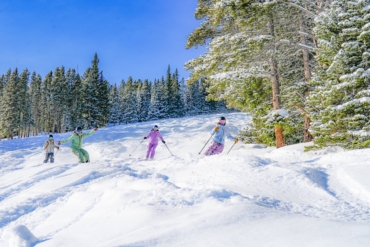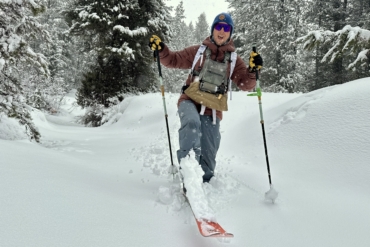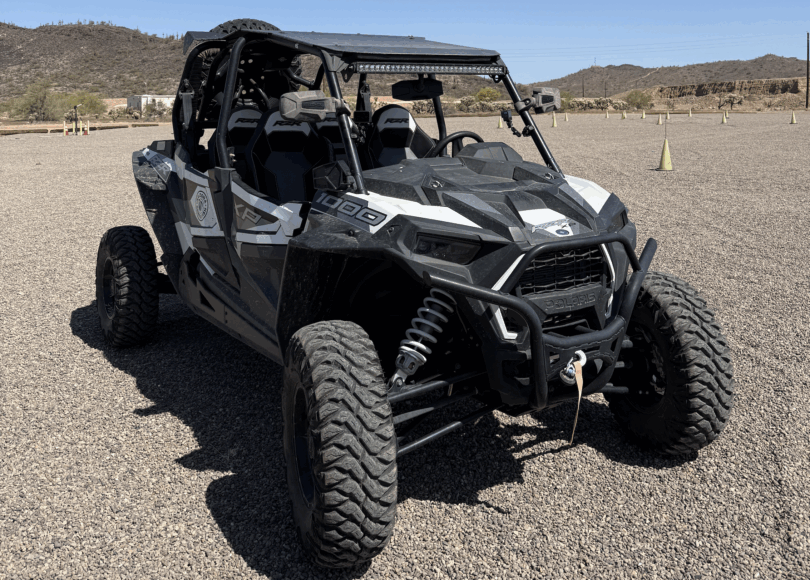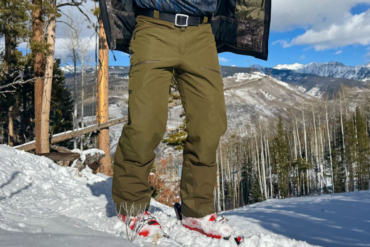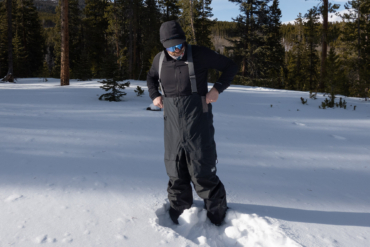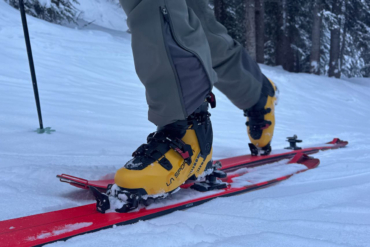In outdoor hot spots including Wyoming, Colorado, Utah, and Canada, 911 centers report a rising number of false emergency reports from Apple devices.
When Jackson Hole Mountain Resort opened for the ski season the day after Thanksgiving, the local 911 center fielded at least half a dozen emergency calls from Apple phones and watches.
Apple had just added a new crash detection feature earlier that month. As a result, plenty of skiers were romping around the resort with phones ready to save their lives in the event of an accident.
The only problem? None of the emergencies were real, because Apple’s crash detection can’t tell the difference between a real accident and a skier taking a harmless fall into deep snow.
And because it automatically dials 911 either way, emergency responders can’t tell the difference either.
“It’s a really hard burden on our dispatchers,” Teton County Sheriff Matt Carr told GearJunkie this week. “Their desire is to help everybody. We don’t ignore calls. We just don’t do that … but how much resource allocation do we put toward these calls if most of them aren’t real emergencies?”
Across the United States and Canada, emergency dispatchers are asking themselves the same question. Reports from Colorado, Utah, Wyoming, and British Columbia suggest a rising problem with dispatchers fielding false alarms from Apple devices.
Thus far, Apple has made no official announcement that it’s working on a solution.
Apple turns on iPhone 14’s crash detection feature by default. Here’s how to turn it off.

A Far-Reaching Problem
Apple added the crash detection feature in November, so perhaps it’s no surprise that the rash of false alarm reports is (for the moment) coming from ski towns.
The tech company actually added automatic crash detection to its watches a few years ago. But now the feature has been added to iPhone 14s, so the phones call 911 whenever they sense a sudden impact. As a result, dispatchers have seen a spike in emergency calls from skiers’ phones.
In Colorado, at least five counties with busy ski areas have experienced record numbers of automated emergency calls, The Colorado Sun reported. Those include Grand, Eagle, Pitkin, Routt, and Summit counties. In Pitkin County, for example, 911 dispatch now gets 15-20 automated calls a day, according to the publication.
Dispatchers handle 911 calls in the order they are received, which means an automated call could postpone responses to real emergencies. So far, no help has been required in any of the automated calls in Summit County, Trina Dummer, the interim director of the Summit County 911 Center, told The Colorado Sun.
“We are absolutely diverting essential resources away from people who need it, toward a feature on a phone,” Dummer said.

Search and rescue organizations in British Columbia have also reported a rising number of false emergencies from Apple, Calgary’s CTV News reported.
Peter Reid, a member of Search and Rescue for Kimberley, B.C., has dealt with several such incidents, he told local news. New technology is often a “wonderful thing,” but it also needs to be used “in a proper fashion,” Reid said.
And in Utah, iPhones and Apple Watches began sending out false alarms on a daily basis in December, dispatchers told GearJunkie.
“I’m not aware of one that was a real accident,” said Elyse Haggerty, deputy director of operations for Salt Lake Valley Emergency Communications Center. “It definitely feels worth it if we can save just one person. But I don’t think this is what Apple intended.”
Ver esta publicación en Instagram
Growing Pains or a Long-Term Issue?
Haggerty said she’s meeting this week with local fire and police departments. She wants to make sure that all the area’s emergency responders are on the same page about how to handle the rising number of calls.
“It’s coming up a lot in the ski areas when someone is actually just fine,” she said. “Most of the calls we’re getting are like ‘Oh sorry, I didn’t know my phone/watch/gadget called you.'”
Sometimes the false alarms happen while skiers are just riding the gondolas, Haggerty said. It’s the responsibility of 911 dispatchers to call back every automated alert. If no one answers, then responders have to go to the location.
But despite all that, Haggerty sees the issue as the growing pains of new technology. She remembers the same problems when cell phones became commonplace about 15 years ago.
“When cell phones first came out, it was wild and crazy. There wasn’t a process for how to handle them,” she said. “I’m sure we’ll do the research and figure out how we want to move forward with this.”
Teton County Sheriff Carr is less understanding. Just last week, emergency responders launched a helicopter from Wyoming’s Lincoln County after dispatchers received an Apple alert. They thought they heard the sounds of someone in pain in the background, and flew to check it out, Carr said.
“It turned out to be another false alarm,” he said. “Anytime you put a helicopter in the air, you’re risking those people.”
Like Haggerty, he recalled other rashes of false alarms with the OnStar service about 10 years ago and more recently with the location-tracking app Life360. The Life360 app continues to cause frequent false alarms, mostly among snowmobilers. And the OnStar issue sorted itself out as the service became less popular, Carr said.
But it’s hard to imagine Apple iPhones going out of style anytime soon.

Waiting for Apple
GearJunkie contacted media representatives for Apple. They refused to comment or respond to the reports of false alarms at ski resorts across North America.
They also declined to answer any questions.
One spokesperson (who asked to remain anonymous) sent several bullet points about the development of the crash detection feature. What seems clear from those details is that the technology was designed primarily to detect car accidents.
Apple developed the feature after more than 1 million hours of “crash data, real-world driving, and crash test labs,” the spokesperson said. The company tested “thousands of iPhone and Apple Watch devices in real passenger vehicles,” while focusing on “minimizing false positives,” according to the spokesperson.
It’s possible for users to cancel an emergency call at any time. And the devices sound an alarm to let owners know there’s a 911 call in progress.
But as Haggerty pointed out, many people may not hear or feel the alert through multiple layers of thick winter clothing — or even care if they’re currently zipping down a ski slope.
Apple has also released several recent updates that it claims can address the problem of false positives (iOS 16.1.2 and iOS 16.2 for iPhones and watchOS 9.2 for Apple Watches).
“It is important for us to provide support to the Public Safety Answering Point [another term for 911 centers] and field response communities,” the company spokesperson wrote. “We’re actively engaging with them and getting their feedback.”
The bullet points say nothing about developers considering the fact that iPhone users tend to take their phones everywhere, including ski slopes.

Raising Awareness Among iPhone Users
Back in Teton County, Sheriff Carr said that his own experience with Apple representatives proved less than engaging.
A team from Apple came to the area last year to test out a different emergency feature: satellite SOS calls from the backcountry. Southwestern Wyoming has plenty of places devoid of cell service, and Carr said that the new feature, which debuted with the fall release of iPhone 14, seemed to work great.
It could potentially “take the search out of ‘search and rescue,'” he said. (The SOS feature might have already saved the life of a stranded snowmobiler in Alaska last month.)
“But I also said we’d like to talk about the issue with the crash detection feature, and they did not want to have a conversation about that,” Carr said. “That made me suspect.”
Apple did say that the software updates mentioned above would improve the situation.
“But from a numbers game, it really hasn’t helped us,” Carr said. He’s also tried to contact Apple again, without any luck.
Instead of trying to get more help from Apple, Teton County emergency responders are working on an awareness campaign among iPhone owners. In short, they’re asking people to just turn off the alarms.
While Carr said he respects the intent of Apple’s crash detection technology, Teton County covers a lot of areas — yet has only a small team of emergency responders.
“That is my concern,” Carr said, “that we’re spending our time dealing with this issue and we’re not responding to the people that really need it.”



